What RV Towing Truck Size Do You Need?
Safely towing a trailer requires the right combination of tow vehicle capacity and trailer weight.
What should be a simple selection or truck size is complicated by so many factors. There are unfamiliar acronyms like GCVWR and CCC; truck and RV salespeople are often uninformed or unscrupulous; and of course there is the reality of your own budget.
Most of us know someone who has unwittingly stumbled into a deal where the salesperson told them “your truck will tow it”. Then, they find that their new truck and trailer combination is unsafe to tow, uncomfortable to tow, or so close to the truck’s capacity limits that they end up damaging expensive components like transmissions.
Selecting the right truck size doesn’t need to be overwhelming.
And luckily the auto industry has responded to the popularity of larger and heavier RVs and today’s pickup trucks are true tow beasts.
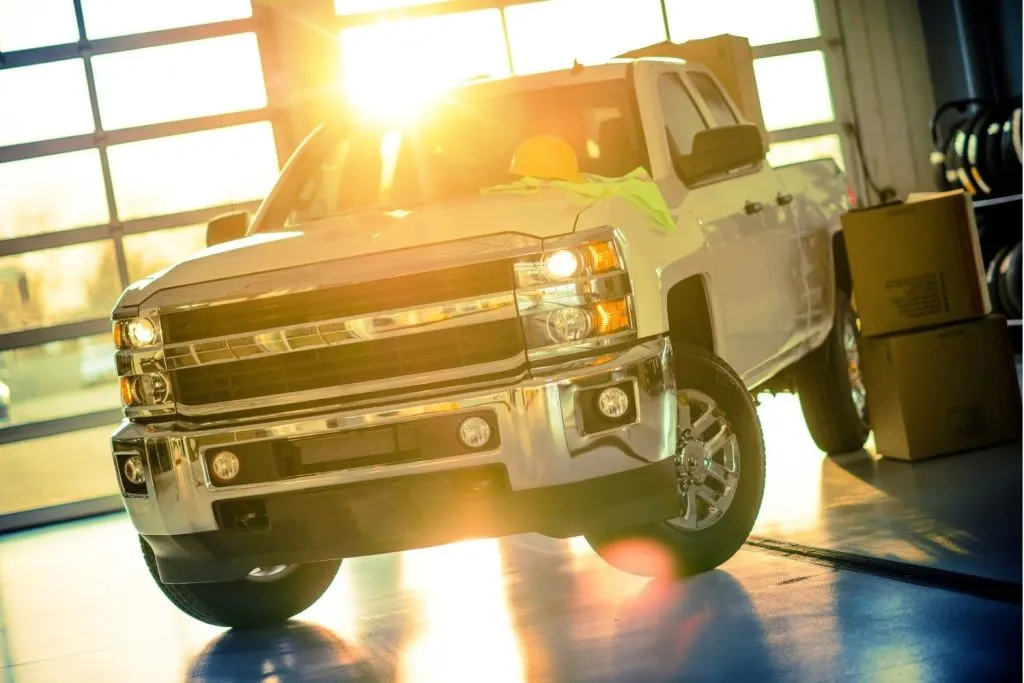
Truck Classifications Simplified
To start, let’s get familiar with the truck classifications and each truck’s suitability for towing.
Compact/Mini: These are the smallest trucks, like the old familiar Ford Ranger or the newer VW Tarok. These are fun and convenient for trips to the beach or tent camping. But, they aren’t suitable for towing more than the smallest teardrop trailers and don’t give you any room to grow.
Mid-Size: Today’s Dodge RAM 1500, Chevy Silverado 1500, and the Ford F150 are the first mid-sized trucks that are designed to be viable tow vehicles. These are the realistic entry point to RV towing.
Full-Size: The big three F250 & 2500 model pickups are the best-suited trucks for most large bumper-pull and fifth-wheel trailers.
Heavy-Duty/Superduty: These are the true “tow beasts” for the largest triple-axle trailers. These trucks have beefed up transmissions, cooling systems, service brakes, also engine and exhaust brakes. So, these trucks are power factories designed for those who believe that you can never have too much truck.

Truck Ton Designations Simplified
Half Ton: The half ton trucks—like the Ford F150 & RAM 1500—are engineered with a maximum payload capacity of approximately 1,000 pounds. Working from front to rear, this capacity includes passengers and gear in the cab, cargo like bikes and firewood in the bed, and the weight of a trailer’s tongue on the hitch in the rear. You should also add the weight of all fluids. This includes fuel and oils to the capacity because the fluids aren’t included in the “curb weight” (or “dry weight”).
¾ Ton: The RAM 2500, Silverado 2500, and Ford F250 are all designed with 1,500 max payload capacities. These work well for the majority of trailers you’ll see at the dealer lots.
One Ton: With full one-ton payload capacities (2,000 pounds), these trucks are built for the largest RV weights. One ton pickups come in single or dual rear wheels (“duallies”). The extra set of dual wheels adds more capacity for heavy fifth wheel trailers. The heavy pin weight of the hitch sits in the bed of the truck.
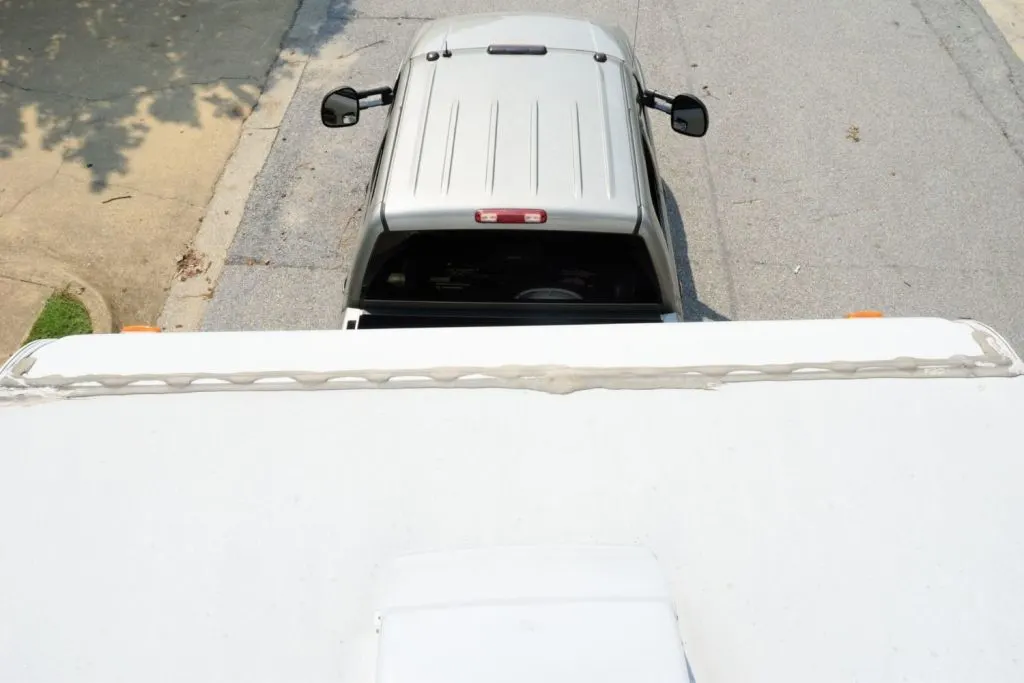
Truck Sizes Payload Capacity vs. Towing Capacity
The tonnage designations are good rough numbers for calculating cargo capacities for passengers, gear, and cargo in the truck itself. But, they don’t necessarily address the requirements for towing an RV behind the truck.
Keep in mind when the RV salesman who pushes you into the largest trailers by saying “your truck can pull it”, he isn’t addressing the true safety concerns. Sure, the truck can pull the heavy trailer in a straight line down the highway. But can it safely stop it? Or, can it safely tow in a straight line when big rigs pass you?
Your truck’s towing capacity will be much higher than the payload ratings, because most of the weight of your trailer rides on the trailer’s axles and wheels.
For example, a one ton dually can easily tow an 18,000 pound fifth wheel. Manufacturers calculate the towing capacity by factoring in the capacity of the brakes, axles, leaf springs, tires, engine, and transmission.
To find out how much a truck can actually tow, find the vehicle’s GCVWR and then subtract the truck’s curb weight. This gives you the gross amount that you can tow: trailer dry weight plus cargo and water.
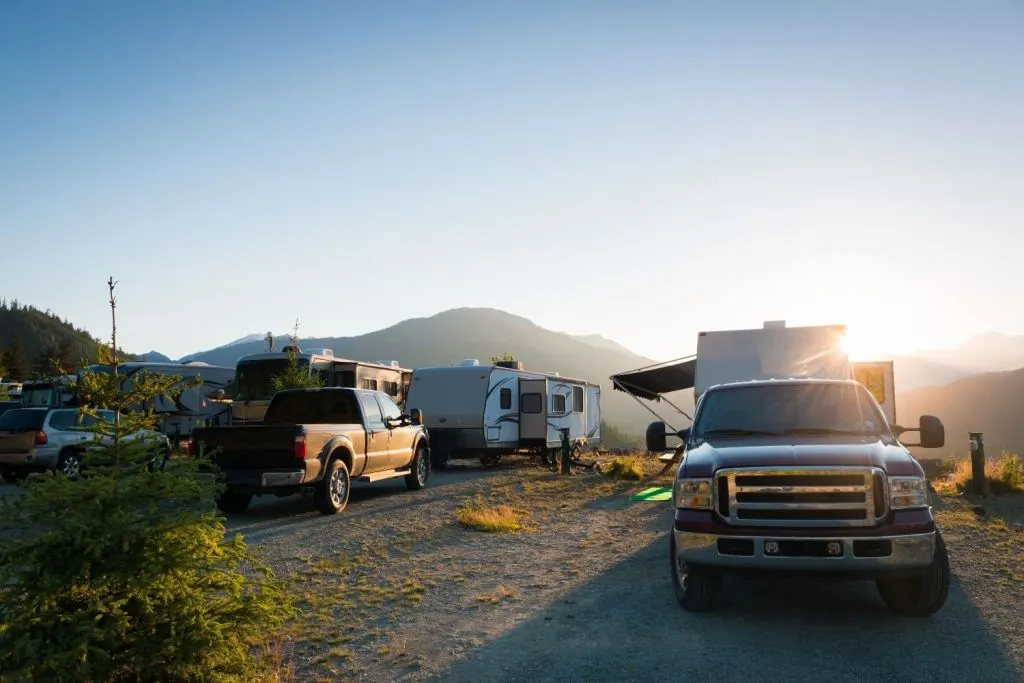
Important Info to Know When Choosing a Truck for Towing an RV Trailer
Pin Weight: For fifth wheel trailers, this is the weight on the hitch in the bed of the truck.
Hitch Weight: For bumper-pull trailers, this is the weight of the trailer’s tongue on the bumper hitch.
GCVWR: The Gross Combined Vehicle Weight Rating is the maximum total capacity of the truck and trailer combined. To calculate how much trailer you can pull, start with the truck’s GCVWR and subtract the truck’s curb weight. The remainder is the maximum gross weight of trailer and cargo (all the “stuff” in your RV) that you can tow.
CCC: The Cargo Carrying Capacity for your truck or trailer is the Gross weight on the sticker minus the dry weight. This number tells you how much gear you can pack before you hit the gross limit. You’ll be surprised how quickly your cargo adds up, between the clothes, food, dishes, tools, and especially water.
Water Weight: Water weighs 8.34 pounds per gallon. This hidden statistic can be one of the heaviest sources of cargo weight.
Bed Size: A bigger bed means more stuff, right? Yes, but the more important benefits of a long bed truck vs. a short bed are stability and maneuverability. The longer bed increases the wheelbase, which increases stability against trailer sway. For fifth wheel trailers, the longer bed also gives you more turning room to maneuver before the nose of the trailer comes into contact with the cab of the truck.
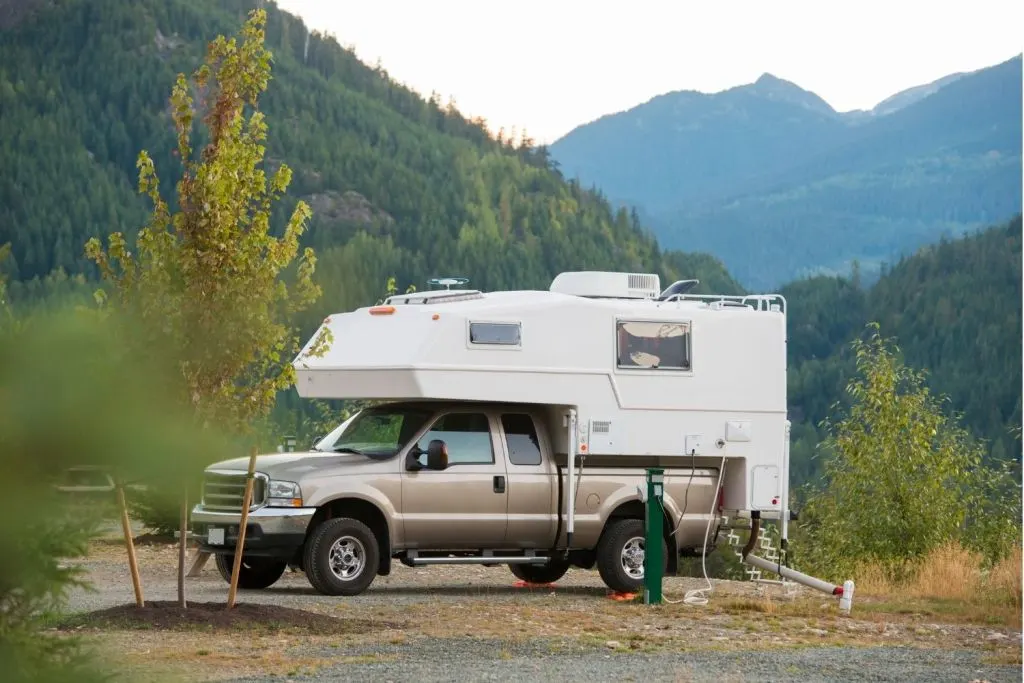
Should You Pick the Truck or RV First?
There isn’t one golden answer because there are so many factors to consider (truck size, trailer size, budget, etc.). Plus many shoppers already own the truck or the trailer and are only shopping for the other item in the set.
As a rule of thumb though, selecting the truck is typically a technical and economic decision compared to the trailer, which is a decision based more on emotions, floorplan, and fit and finish.
If you can afford it, a good strategy is to pick out a reasonable RV and then find the truck that will fit it. This way, you select one of the right RV towing truck sizes for your new rig.
Another strategy is to research the towing capacities of the big three (Dodge, Ford, and Chevy) in a few different truck sizes (half ton and ¾ ton, or ¾ ton and one ton if you’re going big), and then keep these figures in mind as you select your trailer.
Since money really is an issue for most of us, consider shopping for a used truck. Even if your own local market doesn’t have a good supply of comfortable used trucks (not work trucks), you save a bundle shopping in a different area and bringing it home.
Super Dealers like Texas Direct Auto in Houston have massive inventories of used heavy duty trucks. You can fly to Houston, be picked up at the airport by the dealer, and drive home in your new-to-you truck and save an average of $20k over the price of a new heavy duty pickup.
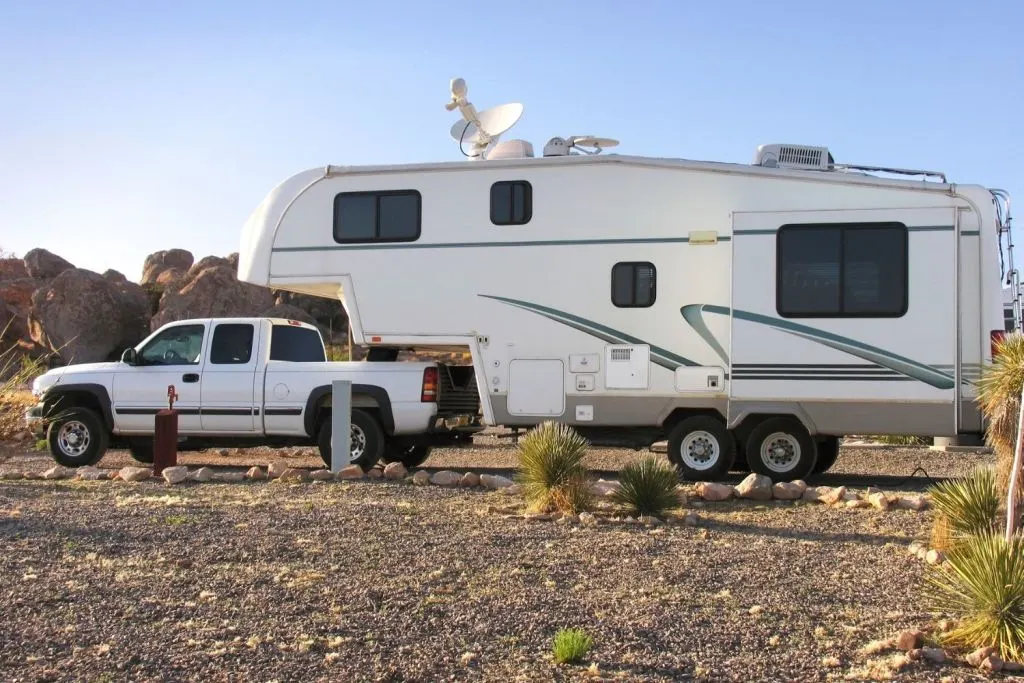
Now You Understand RV Towing Truck Sizes
Hopefully now you understand the different RV towing truck sizes and capacities, as well as the other crucial factors.
Spend some time weighing household items like clothes and food to help you estimate a realistic weight for your cargo. And then spend some time researching the gross weights of trailers that interest you so that you can calculate the right GCVWR required to tow the RV that you love.
Discover the Best Free Camping Across the USA
To be honest with you, we hate paying for camping. There are so many free campsites in America (with complete privacy).
You should give it a try!
As a matter of fact, these free campsites are yours. Every time you pay federal taxes, you’re contributing to these lands.
Become a FREE CAMPING INSIDER and join the 100,000 campers who love to score the best site!
We’ll send you the 50 Best Free Campsites in the USA (one per state). Access the list by submitting your email below:
Back in the old days of the 1980’s I used a Dodge B150 van with 318v8 and auto transmission to tow an 11,000 lb 33 ft. Airstream trailer Seattle to Houston to Chicago and back with no issues. Chicago web of freeways was fun, but nothing bad happened.
I really cannot believe that your bottom line advice is: “(Use) GCVWR and then subtract the truck’s curb weight”! This is incomplete at best and can be dangerously misleading. I would think that you were more knowledgeable.
In every real word scenario I have examined, the key specs are the max cargo weight and/or the max axle weight of the truck.
With my set up (F150 & 24′ TT) the GCVWR is 16,100 and the curb weight is 5,154. Using your guideline I could pull a trailer weighing 10,946. If I did this I would be dangerously overweight.
Here is why:
The F150 has a max cargo weight of 1,846 (GVWR minus curb weight). Now subtract the weight of everything in the truck including; a full tank of gas, people, your WD hitch and all of your stuff. This leaves you with the max weight that your TT can add to the truck via the hitch. In my case I have about 900′ of total cargo, leaving a margin of 946′. We are just two people and don’t put lots of stuff in the truck. So this number could be higher for others.
Now consider that 10% – 15% of the weight of your TT will be placed onto the hitch, adding to the cargo weight. If 15% of the weight of my TT is on the hitch, them the max trailer weight I can tow is 6,300′. This is no where near the number that you suggest in the article. Even if you use 10% for the hitch weight the max trailer weight is less that you suggest.
The bottom line is that you must consider Cargo (or Payload) Weight when determining how much you can tow. It is usually the limiting specification.
Tow safely!
You made a good point that the brand of the vehicle would also be important to consider for commercial truck towing. I think being familiar with such services will be useful for my own business someday. Being able to hire professionals to deal with the transportation of heavy equipment would surely be convenient.